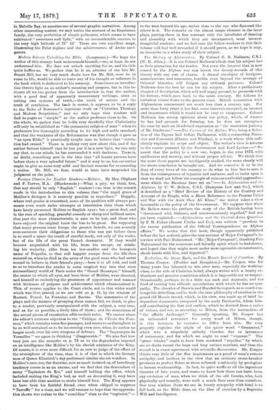Modern Science Unlocking the Bible. (Longmans.)—We hope the author of
this strange book understands himself,—we, at lea.st, do not understand him. He does not unlock anything for us, and his title quite baffles us. We gather that he is an admirer of the late Mr. Stuart Mill, but we very much doubt how far Mr. Mill, were he to come to life, would be able to trace any of his thought or influence in the book which is dedicated to his memory. Sometimes an introduc- tion throws light on an author's meaning and purpose, but in this in- stance all we can gather from the introduction is, that the author, with a good deal of apparently unnecessary verbiage, aims at uniting two systems of truth,—the truth of nature and the truth of revelation. The book is meant, it appears, to be a reply to the Duke of Somerset's ingenious work on "Christian Theology and Modern Scepticism," and we only hope that readers will find its pages as " simple " as the author professes them to be. On the whole, we gather that he holds very decidedly that Christianity will only be established as "the permanent religion of man" when its professors live thoroughly according to its high and noble standard, and that the weakness of the Reformation was that though it gave us "an open Bible," it practically taught men to believe that "revela- tion had ceased." There is nothing very new about this, and if the author flatters himself that he has put it in a new light, we can only say that, to our minds, he has surrounded it with darkness. There is, no doubt, something new in the idea that "all insane persons have before them a very splendid future," and it may be so, but our author ought to give us some very solid and distinct reasons for so consoling a notion. Mr. Mill, we fear, would at least have suspended his judgment on the point.


































 Previous page
Previous page